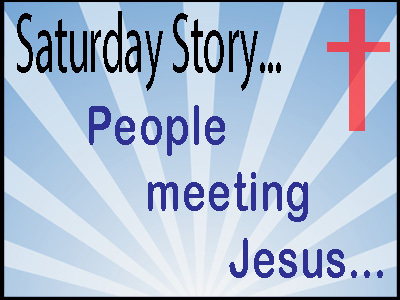
G’day and welcome to Partakers Christian Podcasts! Join us for uplifting Bible teaching, inspiring readings, heartfelt worship, powerful prayers, and fascinating church history. Whether you’re new to faith or growing deeper in your journey, we’re here to encourage and equip you. 🎧 Tune in, interact, and be inspired—wherever you are in the world.
Episodes

Sunday Jun 08, 2025
Bible Thought - Pentecost Sunday
Sunday Jun 08, 2025
Sunday Jun 08, 2025
The Holy Spirit Comes
G'day! Today is Pentecost Sunday where Christians around the world remember and celebrate the coming of the promised Holy Spirit! Happy Pentecost!
Jesus has now ascended back to the right hand of the Father. The 12 apostles are now back in Jerusalem and waiting. Waiting for the Holy Spirit to come. The coming of God the Holy Spirit is in fulfilment of the promise that Almighty and All-powerful God would indwell all those people who chose to follow Him. This event was prophesied many years before. An example is from the prophet Ezekiel:
“And I will put my Spirit in you and move you to follow my decrees and be careful to keep my laws.” (Ezekiel 36:27)
Throughout His earthly ministry Jesus had talked about how after He departed that God the Holy Spirit would come (John 15:26). Starting today and over the coming few days we will look at the Holy Spirit and into the book of Acts seeing how the Holy Spirit worked within and through the early Church. Let's look together!

Saturday Jun 07, 2025
Saturday Testimony - Salvation and Healing
Saturday Jun 07, 2025
Saturday Jun 07, 2025
Saturday Story
People meeting Jesus
A story of salvation and healing
Today on Partakers, we hear the story of salvation and healing coming to a house! Come on in, and listen to this amazing story about the relevancy of Jesus Christ to this woman's life.

Saturday Jun 07, 2025
Bible Thought - Luke Looks Back Part 7
Saturday Jun 07, 2025
Saturday Jun 07, 2025

Luke Looks Back Chapter 7
Luke 5: 27 – 6: 16
The Way of Jesus: people and problems
This passage is a mix of good things about people and some problems Jesus has for us to consider before we start on his positive teaching in the next passage.
The Call of Levi
First there is the story of the call of Levi and a strong suggestion that what he did was good. Then two more stories in which Jesus was challenged over the things he did that people thought he should not do:
- Luke 5:27 - 32 Eating with those with whom one should not eat!
- Luke 5:33 - 39 Eating when one should not eat!
- Luke 6:1 - 11 Doing what one should not do!
Finally Luke gives us the complete list of the Apostles.
First Jesus was eating with those with whom one should not eat - according to those we will call 'the serious' because they were serious about their religion. We read Luke 5:27-32: eating with those with whom one should not eat!
Levi seems to be the same person called Matthew in the other gospels and therefore the person who wrote what we call Matthew's Gospel.
Question 1: What Jesus said to Levi was extremely brief. Just two words: "follow me". How does that differ from what one would expect a religious teacher to say to a possible disciple?
This is not a call to follow a system, a philosophy, or a religion. It is a straight call to follow one person: Jesus. The true call to discipleship is just the same today. There are many half-hearted Christians in the world today. A good question for them is "do you follow Jesus?".
Question 2: Meals are particularly important in Luke's Gospel. Only Luke calls this one a "great banquet" and says the serious people "complained" about who was there. Why does Luke emphasise what happened here so much?
Luke recognises that, for Jesus, life and faith were all about including people in as much as possible rather than turning them away as not good enough, not learned enough, not old enough - anything else for which people are 'not enough'. Doing that still upsets people who consider themselves serious in matters of religion!
Jesus and rules!
In the next story Jesus did not argue against the principles of the Law of Moses but against all the many little rules that people had added to it. He knew that if people are given many rules they will forget the greater principles they should be thinking about. So concern for all these detailed rules would hide the new things he was teaching, particularly those relating to the work of the Spirit. The challenge to us is to identify which of our rules, written or unwritten, get in the way of what we should really be doing. All too often we continue to do the things that our parents and grandparents decided were the right things to do when they were young. But the world we are living in is changing all the time, perhaps faster than it has ever done before. The things that are not part of the necessary centre of our faith may need to be changed. Jesus explains that in some very vivid and exciting short sayings.
Read Luke 5: 33 - 39 : eating when one should not eat!
Question 3: What would you identify as your problems - as a group or as an individual? What are your 'old wine skins' that need to be changed? How? In what way?
The answers to both this and the next question are going to depend very much on your circumstances.
Jesus said "the old wine is better". He is being sarcastic. He knows many think old things are better than new things as old wine is better than new wine but he is challenging his followers to new and better things.
Question 4: What are the things that tend to prevent you, together or individually, moving on to the new and better things of faith? Remember Paul said "if anyone is in Christ, the new creation has come: The old has gone, the new is here!"
The last two stories Luke 6: 1 - 5 and Luke 6:6-11 are both about Sabbath keeping. The Sabbath was the Saturday religious day of the Jews. The early Christians changed their day of celebration to Sunday, the first day of the week, in memory of the resurrection of Jesus. This was one of the three things (keeping the food laws, Sabbath keeping, circumcision) Jews of that time did to show that they really were the people of God.
We read Luke 6: 1 - 11: doing what one should not do!
Question 5: What do Christians in your culture do to show that they are Christians? In particular, what things do they do that are really just a matter of custom and tradition and not really necessary to show they are Christians? Are those things good things of themselves or do they really hinder other people becoming Christians?
Question 6: What did Jesus think about Sabbath keeping? What did Jesus think was more important than rules like that? What would Jesus think about the rules you have identified in your world?
Micah, an Old Testament prophet said "what does the Lord desire of you? To act justly, and to love mercy and to walk humbly with your God" and said that the Lord did not want offerings and sacrifices. Although Jesus never actually quoted those words he often alluded to them.
Jesus chooses and appoints his disciples.
Read Luke 6: 12 - 16.
Of those 12 men only one, John, is certainly known to have died of old age. Peter was crucified upside down (because he did not want to be crucified the same way up as Jesus) in Rome, Thomas probably got the furthest and was killed in south India, the rest died here and there in the ancient world as they proclaimed the good message of Jesus.
Question 7: In calling the Twelve Jesus commissioned them not only to action on his behalf but imitation of him in both life and work. So it is today. Which part of the Christian way do you find most difficult?
Tap or click here to download as an audio mp3

Friday Jun 06, 2025
Prayers Ukraine Russia War Молитви за Україну - Molytvy za Ukrayinu
Friday Jun 06, 2025
Friday Jun 06, 2025

G'day! Today we are praying a series of prayers concerning the Ukraine Russian conflict and war. Молитви за Україну / Molytvy za Ukrayinu
Come! Let's pray together and say your "Amen!" or "May it be so, Lord!"
Click or Tap here to listen to or save this as an audio mp3 file

Friday Jun 06, 2025
Bible Thought - Luke Looks Back Part 6
Friday Jun 06, 2025
Friday Jun 06, 2025

Luke Looks Back Part 6
Luke 4:31-5:26 - The Authority of the Messiah
This passage has been carefully structured by Luke around the idea of authority. It starts off with 2 episodes in which Jesus shows his authority by first driving out an evil spirit and then healing many people. It ends with 2 episodes in which Jesus heals a man of leprosy, a symbol of evil, and heals a paralysed man. In between these 2 pairs of episodes Jesus shows his authority by proving that he, a carpenter, can catch more fish than the fishermen can. This middle story is the most important because it shows the authority Jesus had most clearly.
First we read Luke 4: 31 - 44
Question 1: Twice in these episodes, when the man with an evil demon calls him 'the Holy One of God' and when the demons call him 'the Son of God', Jesus was more accurately identified by demonic powers than by ordinary people. Why was that? What are our modern day equivalents?
That is a hard question to answer. Perhaps the otherworldly powers were more sensitive to the power of Jesus than ordinary people were. Are we as sensitive to the things of the Lord as we should be?
Question 2: Why does Luke tell us that Simon's mother-in-law went straight back to the housework.
Luke tells us how complete and natural the healing was. Simon's mother-in-law was able to go back into the kitchen and work. In the ordinary way she would have needed time to recover from the fever. The healing by Jesus was very special. In the same way when he heals us of our problems, physical, mental or spiritual, he often heals us instantly.
The story of Luke 5: 1 - 11 is clearly the most important part of this passage. Fishing with nets in the Sea of Galilee was done when the fish rose to feed on the surface at night. There could only possibly have been a shoal near the surface in the daylight if a new fresh water spring had opened up in the seabed. (This is an area of volcanic activity). Jesus knew something nobody else did.
We read these verses now. 5: 1 - 11
Question 3: What might Simon and John have said to each other when they thought Jesus could not hear when he, a carpenter, told them to go fishing in broad daylight!
"Who does he think he is?" "Telling us where and when to fish indeed." "What does he know about it?" "He's only a carpenter." "Thinking because he is a prophet he knows where to fish. What rubbish!" And so on.
A boat of those days has been dug up. It was 8m long and 2m wide. So it would have needed a crew of rowers and would have held a lot of fish before it began to sink! So this was a very big catch meaning enough money for many weeks for the families concerned.
Question 4: What did Peter do which he must have done so that nobody else was able to share their good fortune (listen again to v 7)?
Signalling instead of shouting would have stopped other fisherman realising what had happened and joining in the big catch.
Question 5: What does this episode teach us about the relationship between money and spiritual commitment?
Practical rewards do sometimes follow devotion of time and energy to spiritual matters as they did in this case. But they do not always do so. We must be prepared to sacrifice things for the sake of the Kingdom.
Question 6: Peter wanted to distance himself from Jesus when he 'fell at Jesus' knees and said "Go away from me, Lord; I am a sinful man"' because he thought the unclean contaminated the clean and he was unclean. How did Jesus view this? What is the implication for us?
Peter was following the teaching of the OT. Leviticus 10: 10 says, 'distinguish between the holy and the common, between the unclean and the clean'. These teachings were mainly about ceremonial cleanliness. Jesus ignored such things. He taught that the things that matter are love God and loving our neighbour. Ceremony is not important in the Kingdom of God.
Question 7: Peter recognised the authority of Jesus over him as a result of the events on the lake. How do we know Jesus has authority over us?
The disciples had seen a great miracle. But so do we when the Almighty God calls us to follow him and we respond. He then forgives our sins, promises us final salvation at the end of the ages and gives us his Holy Spirit to guide us until then. If we do not recognize his authority we are poor judges of what is good and great and what is of great advantage for us!
Read Luke 5: 12 - 26.
"Leprosy" in the Bible may not have been what we call leprosy these days but any of many skin diseases.
Question 8: Jesus said "I am willing" and touched the man. What does that tell us about Jesus?
Jesus entered fully into human life. He related easily to the outcast, leper man and touched him. That made him, Jesus, unclean under Jewish law but Jesus ignored that. He was interested in the realities of life not the details of religious practice.
Question 9: The paralysed man's sins were forgiven not because of his faith but of 'their faith'. Do you think one person's faith can work to heal someone else today?
If faith cannot work like that there is not much point in praying for anyone else - which we all do. It is lovely the way Jesus says 'I am willing' to heal someone and calls the guy on the stretcher 'friend' even although his friends have just made a mess of the roof of what was probably his, Jesus' , house.
Click here to download as an audio mp3

Thursday Jun 05, 2025
Thursday Testimony Story - God Said No
Thursday Jun 05, 2025
Thursday Jun 05, 2025
G'day and welcome to Partakers! Today we hear a testimony of how Partakers began! May 2007, in the final week before final dissertation submission at Moorlands College, I collapsed while at the GP. While unconscious I said "Dad, can I come home now?"
To which I was told by God, "No. Get up. We have a job for you to do." So I sat up, and the emergency paramedics came in, almost fainted and said: "You aren't supposed to be sitting up..." Collapse caused by sepsis due to ingrown hairs on my leg... Because of these events, we now do what we are doing, thanks be to God, reaching over 120 countries a year via social networks, paperbacks, ebooks, Podcasts and YouTube... Thanks for being part of our life, and I hope that I have shown in some way, that God loves you...
Come on in, listen to what happened next, how we began. By listening, you are sharing in the work that God has been doing through us!
Click or Tap here to listen to or save this as an audio mp3 file
~
You can now purchase our Partakers books! Please do click or tap here to visit our Amazon site!

Thursday Jun 05, 2025
Bible Thought - Luke Looks Back Part 5
Thursday Jun 05, 2025
Thursday Jun 05, 2025

Luke Looks Back Chapter 5
Study 5 - Luke 4:14-30
The Announcement of the Messiah
We start off this study with a question. Question 1: Where was your hometown? What was, or is, memorable about it?
Read Luke:4:14 to 23.
Nazareth was the hometown of Jesus, where he grew up. It was a small village in the middle of the province of Galilee, mainly of Galileans but including some Jews from the far away province of Judea. The people of Galilee were often of mixed ancestry so there is likely to have been considerable antagonism between them and the purer blooded Judean Jews who regarded themselves as the only proper Jews. As a result Judean Jews of Nazareth, as the family of Jesus were, were most probably foreigners in their own community. The two slightly different peoples were probably not friendly to each other. That, not the best of places, was where Jesus spent most of his childhood days!
Luke uses the story of what happened when Jesus read from the OT book of Isaiah in the synagogue there, to start explaining how we are to understand the ministry of Jesus. Jesus had to deal with a strong expectation among ordinary people that the Messiah would behave in certain ways. He had a major job to change that expectation.
Jesus read just one and a half verses from Isaiah 6. We will read more verses to get the context of what he read. We may assume his listeners knew the passage well so that hearing the verses he read they would immediately remember the following verses. Listen carefully to the picture these verses give.
Isaiah 61: 1 - 7.
Question 2: What would those verses have made them think Jesus was going to do if he really was the Messiah? What would they have been expecting him to call on them to do?
Like many of the other passages in the Old Testament that talk about the Messiah these verses would have made them expect leadership in a successful military campaign against the Romans. Brothers, called the Maccabees, had led Israel against the Syrians 200 years earlier with great success. If he succeeded the men would expect to have to join his army. Of course, we know that such a venture would have been hopeless. The Roman armies were exceedingly difficult to beat. Only the most warlike of peoples in other parts of the Empire had any success against them, and then not for very long.
Question 3: The next half verse in Isaiah to the one Jesus read says 'and the day of vengeance of our God'. He stopped without reading that out. What would that have suggested to the people who listened to him?
I think they would have found it a great puzzle, which is why they listened to what he said next so carefully. He seemed to be promising that he would be a mighty spiritual leader but not a war leader. They would have thought of 'the day of vengeance' as the day when their God would bring the world they knew to an end with the defeat of the hated Romans.
Read Luke 4:24 - 30
Question 4: Jesus went on to remind them of the stories of the widow of Zarephath and Elijah (1 Kings 17: 2 - 10a the brook Kerith was east of Jericho, Zarephath was the other side of Israel near Sidon, a Phoenician city)) and of Naaman and Elisha (2 Kings 5: 1, Aram was another name for Syria ). Why did Jesus do that? What point was he making, apart from the obvious one of 'not in my hometown'?
All these places were outside Israel. He was saying that as they rejected him he was going to go to other people outside Israel. They did not like that idea at all. Quite why he did that is a bit of a mystery.
Question 5: If a politician, wanting to influence people and starting off an election campaign was nearly lynched - murdered by a mob - as Jesus was he would not be likely to get on very well. The story does not give a good impression of Jesus. Why does Luke tell us about this episode when he could so easily not have done so? What is it about the ministry of Jesus that Luke wants us to think about?
Luke is expecting what he writes to be read mainly by Gentiles - Romans. He has emphasised that the 2 great prophets Elijah and Elisha helped Gentiles. Christian faith is for all peoples, not any special nation or people group. Probably the fact that Jesus was rejected by the Jews like this made him sound better to a Roman, like Theophilus! But, above and beyond that, Luke will have chosen this episode because it gives such a clear picture of what Jesus was going to do in his ministry.
Question 6: It says, "Jesus walked right through the crowd and went on his way". What does that suggest?
It tells us that Jesus had an unusual air of authority about him. Perhaps too, that angels protected him.
Question 7: Looking now at the whole story - what 2 things is Jesus emphasising by what he says and does that are of fundamental importance in our understanding of God and of faith?
He has appealed to the Scriptures of the Old Testament to establish who he is. And the Scripture he read emphasised the work of the Spirit both for preaching and healing. These are the 2 fundamental sources for our understanding too - the Scriptures and the Holy Spirit - though we have, of course, the tremendous advantage of having the writings of the New Testament as well as those of the Old.
Click here to download as an audio mp3

Wednesday Jun 04, 2025
Wednesday Wisdom 1 - Proverbs 1
Wednesday Jun 04, 2025
Wednesday Jun 04, 2025

Wednesday Wisdom
Proverbs 1
G’day! Welcome to Partakers and to Wednesday Wisdom, where we are listening to what the Bible has to say through the Wisdom literature of Proverbs, Ecclesiastes and Song of Solomon. Come on in!
Today it is Proverbs 1. Download this episode using this link
1 The proverbs of Solomon the son of David, king of Israel;
2 To know wisdom and instruction; to perceive the words of understanding;
3 To receive the instruction of wisdom, justice, and judgment, and equity;
4 To give subtilty to the simple, to the young man knowledge and discretion.
5 A wise man will hear, and will increase learning; and a man of understanding shall attain to wise counsels:
6 To understand a proverb, and the interpretation; the words of the wise, and their dark sayings.
7 The fear of the Lord is the beginning of knowledge: but fools despise wisdom and instruction.
8 My son, hear the instruction of your father, and forsake not the law of your mother:
9 For they shall be an ornament of grace to your head, and chains about your neck.
10 My son, if sinners entice you, consent You not.
11 If they say, Come with us, let us lay waiting for blood, let us lurk secretly for the innocent without cause:
12 Let us swallow them up alive as the grave; and whole, as those that go down into the pit:
13 We shall find all precious substance, we shall fill our houses with spoil:
14 Cast in your lot among us; let us all have one purse:
15 My son, walk not you in the way with them; refrain your foot from their path:
16 For their feet run to evil, and make haste to shed blood.
17 Surely in vain the net is spread in the sight of any bird.
18 And they lay wait for their own blood; they lurk secretly for their own lives.
19 So are the ways of every one that is greedy of gain; which takes away the life of the owners thereof.
20 Wisdom cries without; she utters her voice in the streets:
21 She cries in the chief place of concourse, in the openings of the gates: in the city she utters her words, saying,
22 How long, you simple ones, will you love simplicity? and the scorners delight in their scorning, and fools hate knowledge?
23 Turn you at my reproof: behold, I will pour out my spirit to you, I will make known my words to you.
24 Because I have called, and you refused; I have stretched out my hand, and no man regarded;
25 But you have set at nothing all my counsel, and would none of my reproof:
26 I also will laugh at your calamity; I will mock when your fear comes;
27 When your fear comes as desolation, and your destruction comes as a whirlwind; when distress and anguish comes upon you.
28 Then shall they call upon me, but I will not answer; they shall seek me early, but they shall not find me:
29 For that they hated knowledge, and did not choose the fear of the Lord:
30 They would none of my counsel: they despised all my reproof.
31 Therefore shall they eat of the fruit of their own way, and be filled with their own devices.
32 For the turning away of the simple shall slay them, and the prosperity of fools shall destroy them.
33 But who ever gives head to me shall dwell safely, and shall be quiet from fear of evil.
Click or Tap here to listen to or save this as an audio mp3 file

Wednesday Jun 04, 2025
Bible Thought - Luke Looks Back Part 4
Wednesday Jun 04, 2025
Wednesday Jun 04, 2025

Luke Looks Back Chapter 4
Luke 3:19-4:13
The Preparation of the Messiah: his baptism
Luke rather oddly records the imprisonment of John (3: 19, 20) before the baptism of Jesus by John. He does this because only Jesus is really important in the rest of the story.
He continues his account of the preparation of Jesus for his ministry with first his baptism and then his temptation.
1) Ice breaker. What was the most memorable part of your baptism (if you were old enough to remember it) or confirmation?
2) Matthew tells us why Jesus was baptised (Matt 3: 15). Luke is only concerned with what happened when he was (v 21 - 23). Which major Christian teachings are important in what happened? Why is it important for us to hear about these before we hear about Jesus starting his ministry?
Genealogies were important in those days to show who someone was. Why this one is considerably different from the one that Matthew gives is not clear. Both are carefully structured around (different) multiples of seven. Probably Luke is most interested in his last line: Jesus was the son of God.
The main purpose of the three temptations is to teach us things about Jesus. Things like the order of the temptations, different in different Gospels, are not important. We will explore five emphases of the temptations in the following questions:
3) The temptations make clear the nature of Jesus' work as the Son of God. In which verses in this story is Jesus called the Son of God? What sort of Messiah will the people have been expecting from texts like: Gen 49: 10; Num 24: 17 - 19; 1 Sam 21: 11 (an example of how a Davidic king was supposed to be); Ps 2: 6 - 12; Is 11: 1,4,10 - 14; Dan 7: 13, 14, 27; Zec 9: 9 - 17? How do the temptations show that what they were getting was very different from what they expected? Which were fulfilled then and which are still to be fulfilled?
4) Share something of how your own understanding of Jesus has changed during your Christian life as you have learned more about him.
5) The temptations of Jesus are very like some of the great events of Israel's history. Read Ex 16: 2 -4; 17: 1 - 7; 32: 1 - 4; and 1 Cor 10: 1 - 7. Which story in Exodus is like each one of the 3 temptations? What is the fundamental difference between each pair of experiences?
6) The temptations demonstrate the antagonism of Satan to the Kingdom of God. In some churches Satan is never mentioned; some talk too much about him, blaming him for every thing that goes wrong even when it is a very human fault. How would you rate our emphasis on Satan: too much, too little or just right? How does it compare with the emphasis in Luke's story?
7) The temptations emphasise that Jesus' ministry is the fulfilment of scripture. Identify how they do this. This emphasis is particularly important in the end of Luke's Gospel at Lk 24: 32. What do you find the hardest part of reading and learning from scripture? What tips can you give other people to ease the problem?
8) The temptations show Jesus' followers a way to resist temptations. The basic ideas behind the three temptations are 1) using your faith for personal gain; 2) using it to make yourself look good before other people; 3) putting God to the test in practical ways. Look at each temptation and decide whether those are the right descriptions of them. If not, what is? In what ways, often trying to hide their real motives, do people sometimes try to put God to the test? Which of these temptations do you experience most?
9) The devil left Jesus 'until an opportune time' (v 13). When, or under what circumstance, does he get a good opportunity to go after us? What can we do to discourage him?
Click or tap here to download as an audio mp3

Tuesday Jun 03, 2025
Tuesday Psalm - Psalm 119
Tuesday Jun 03, 2025
Tuesday Jun 03, 2025
Psalm 119
א Aleph
1 Blessed are those whose ways are blameless,
who walk according to the law of the Lord.
2 Blessed are those who keep his statutes
and seek him with all their heart –
3 they do no wrong but follow his ways.
4 You have laid down precepts
that are to be fully obeyed.
5 Oh, that my ways were steadfast
in obeying your decrees!
6 Then I would not be put to shame
when I consider all your commands.
7 I will praise you with an upright heart
as I learn your righteous laws.
8 I will obey your decrees;
do not utterly forsake me.
Right mouse click or tap here to save/download these Psalms as a MP3 file
You can now purchase our book commenting on the Psalms! Please do click or tap here to visit our Amazon site!
Click or tap on the appropriate link below to subscribe, share or download our iPhone App! ![]()
![]()
![]()
![]()
![]()
![]()
![]()
![]()




